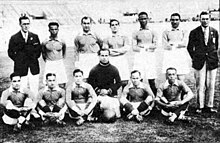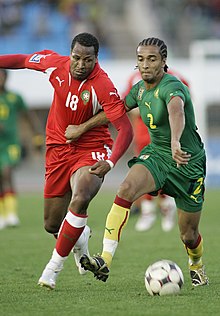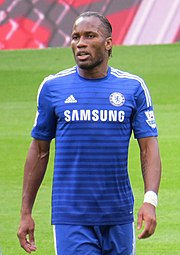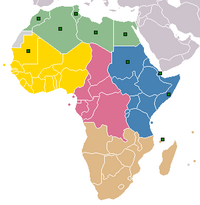Portal:Football in Africa
Introduction
Football is the most popular sport in Africa. Indeed, football is probably the most popular sport in every African country, although rugby and cricket are also very popular in South Africa. (Full article...)
This section may be unbalanced towards certain viewpoints. (October 2022) |

Selected article -

The African Footballer of the Year award, presented to the best African footballer each year, has been conferred by the Confederation of African Football (CAF) since 1992.
Samuel Eto'o and Yaya Touré have won the award the most times (4 wins each), Two-time winner Didier Drogba is the player with the most runner-up appearances (4), most third place finishes (3), and most times in the top three (9). The France-born Frédéric Kanouté, Riyad Mahrez and Pierre-Emerick Aubameyang are the only European-born players to win the award (both Kanouté and Aubameyang initially featured for France's U21 squad before going on to represent Mali and Gabon, respectively). The winner of the 2023 edition is Victor Osimhen.
Selected biography -
After playing in youth teams, Drogba made his professional debut aged 18 for Ligue 2 club Le Mans. A late bloomer, he signed his first professional contract aged 21; it was not until the 2002–03 season that he realised his potential, scoring 17 goals in 34 appearances in Ligue 1 for Guingamp. He moved to Olympique de Marseille in 2003 for £3.3 million. His scoring success at Marseille continued, finishing as the third highest scorer in Ligue 1 with 19 goals and helped the club to reach the 2004 UEFA Cup Final.
In the summer of 2004, Drogba moved to Chelsea for a club record £24 million fee, making him the most expensive Ivorian player in history. In his debut season he helped the club win their first league title in 50 years, and a year later he won another Premier League title. He went on to win three Premier League titles (clinching the Golden Boot twice in the process), four FA Cups and one League Cup. In March 2012, Drogba became the first African player to score 100 Premier League goals, and made his last appearance for Chelsea in the 2012 UEFA Champions League Final, in which he scored an 88th-minute equaliser and the winning penalty in the deciding shoot-out against Bayern Munich.
Selected image -
Subcategories
Related portals
More sports portals
WikiProjects
Related task forces and sub-projects
African football task force
WikiProject Africa • WikiProject Football
WikiProject Football task forces and sub-projects
 | |
| Wikipedia ads | file info – #250 |
Topics
Open tasks

- Expand stubs: Competitions in Africa • Organizations
- Expand club articles of teams from Africa.
- Expand biographies of Africans involved in football.
- Create: Requested articles • Most wanted football articles • Requested general football articles
- Add: Infoboxes • Images (General requests, Requested images of people)
- Review: articles currently under review
- Assess: Assessment requests • Assess an article
- Revert vandalism on this portal and on African football articles
- Assist in maintaining this portal and keeping its selected content up to date.
- WikiNews: Create and submit news stories about African football for Wikipedia's sister project WikiNews.
Associated Wikimedia
The following Wikimedia Foundation sister projects provide more on this subject:
-
Commons
Free media repository -
Wikibooks
Free textbooks and manuals -
Wikidata
Free knowledge base -
Wikinews
Free-content news -
Wikiquote
Collection of quotations -
Wikisource
Free-content library -
Wikiversity
Free learning tools -
Wiktionary
Dictionary and thesaurus
More portals
Sources

- ^ "The History Of Soccer In Africa". NPR.org. 2010-06-09. Retrieved 2016-03-31.
- ^ a b c Alegi, Peter (2010). African Soccerscapes. Ohio University Press. pp. 1–2. ISBN 9780896802780.
- ^ Frimpong, Enoch Darfah. "Ghana news: A world of superstition, frustration and disillusionment - Graphic Online". Retrieved 23 September 2017.
- ^ Lacey, Marc (8 August 2002). "Kangemi Journal; For Spellbinding Soccer, the Juju Man's on the Ball". The New York Times. NY Times. Retrieved 2016-03-31.
- ^ "World Cup Witchcraft: Africa Teams Turn to Magic for Aid". National Geographic. Archived from the original on July 10, 2006. Retrieved 2016-03-31.
- ^ Andy Mitten (September 2010). The Rough Guide to Cult Football. Rough Guides UK. ISBN 9781405387965. Retrieved 2016-04-02.
- ^ "African Nations Cup overshadowed by hocus pocus | Football". The Guardian. Retrieved 2016-04-09.
- ^ Kuper, Simon (2006). Soccer Against the Enemy: How the World's Most Popular Sport Starts and Stops Wars, Fuels Revolutions, and Keeps Dictators in Power. Nation Books. p. 123. ISBN 978-1-56025-878-0.


























